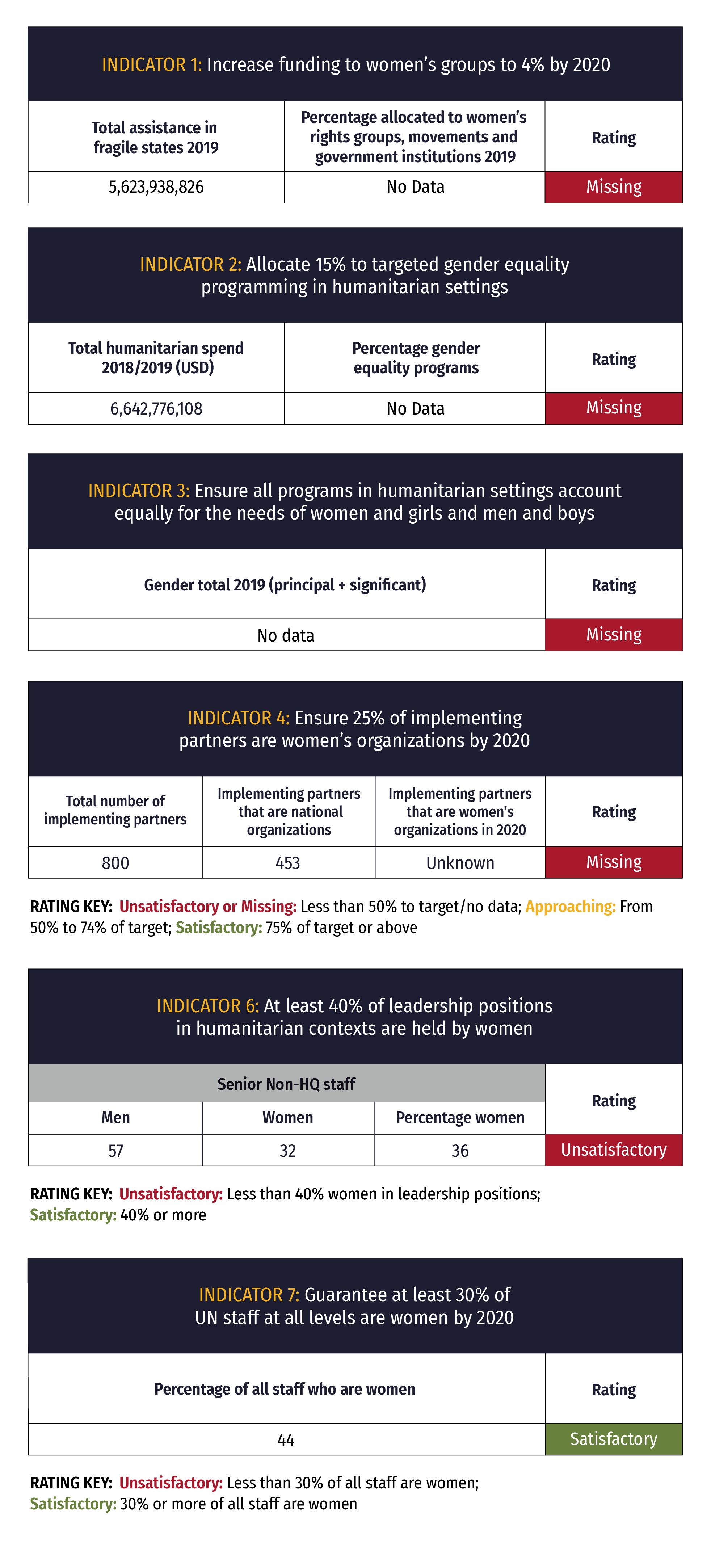The following information was submitted by several UN agencies reviewed in the report to provide additional context and data.
How World Food Programme (WFP) Scored on Our Report Card

What WFP Is Doing to Support Women and Girls in Crisis
Commitment to gender equality
The World Food Programme (WFP) is committed to pursuing and strengthening gender-transformative approaches to realizing a world of zero hunger. This is because WFP knows that a world with zero hunger can only be achieved if women, men, girls and boys have equal opportunities, equal access to resources and equal influence in shaping their futures. The pursuit of gender equality and women’s empowerment is central to WFP’s dual mandate of saving lives and changing lives, to tackle the gender inequalities that are exacerbated when crises strike, and which hold back sustainable development.
Strategic action on gender equality
To translate its commitment to action, WFP developed a set of tools and standards that require the integration of gender throughout development programs s and humanitarian responses. All WFP country strategic plans are required to achieve a minimum Gender and Marker score of 3, indicating full integration of gender, and include a gender equality budget, with the corporate target of 15% of funds spent on gender equality activities. The WFP corporate gender mainstreaming program — the Gender Transformation Program — engages WFP Country Offices, translating gender mainstreaming into a series of practical steps fostering accountability mechanisms, enabling workplace environments, capacities, partnerships, programs and knowledge to deliver gender equality results across all areas of work.
Gender equality in humanitarian response
As one of the world’s largest humanitarian actors, WFP is working with women and men in conflict contexts and following natural disasters to meet their immediate needs — food, income, safety. At the same time, along with mitigating the most extreme consequence of a humanitarian crisis, WFP works with partners to transform lives, to foster resilience and recovery that is transformative. This includes providing food assistance as cash-based transfers with the opportunities for women to access resources, have greater decision-making power and financial inclusion and invest in livelihoods. In Syria, for example, 2020 data showed that in 80% of households, decisions on the use of the assistance received were made jointly with or by women. Working with local partners, WFP has been able to increase its support for the sexual and reproductive health of women and girls in Afghanistan, Cameroon, Nigeria and South Sudan. Cognizant of the key role of men in changing discriminatory social norms, in Somalia, for instance, WFP undertakes gender-transformative programs through engaging men in nutrition programming and forming father-to-father support groups.
Gender equality in development contexts
Operating across the humanitarian-peace-development nexus, WPF also applies gender-transformative approaches in development contexts, for the food security and nutrition of women, men, girls and boys living in rural and urban settings. As shown in the recent WFP Gender Policy (2015–2020) evaluation, WFP supports a growing number of programs where women have been afforded new opportunities to engage in decision-making. Opportunities include asset creation and livelihoods, nutrition and school-feeding programs, for example, through community-based participatory planning or the management and oversight of general food distribution committees.
WFP Gender Policy 2015-2020’s goal is to enable WFP to integrate gender equality and women’s empowerment into all of its work and activities, to ensure that the different food security and nutrition needs of women, men, girls and boys are met. The policy aims to achieve the following four main objectives: i) Food assistance adapted to different needs where women, men, girls and boys benefit from food assistance programs and activities that are adapted to their different needs and capacities; ii) Equal participation in which women and men participate equally in the design, implementation, monitoring and evaluation of gender-transformative food security and nutrition programs and policies; iii) Decision-making by women and girls where women and girls have increased power in decision-making regarding food security and nutrition in households, communities and societies; iv) Gender and protection where food assistance does no harm to the safety, dignity and integrity of the women, men, girls and boys receiving it and is provided in ways that respect their rights.
Integrated approaches to poverty reduction — such as the Enhancing Food Security and Nutrition program in Bangladesh, which provides women in Cox’s Bazar with cash-based transfers together with livelihoods training, awareness-raising, savings groups and engagement with village leaders — have demonstrated transformative results, including women’s financial self-sufficiency, improved social capital and reduced incidence of gender-based violence.
Gender parity
In line with WFP Gender Parity Action Plan, WFP has been intensively working to increase the number of women among its staff. This is reflected in a progressively increasing parity across all functions, including women in senior positions in humanitarian response operations. As of March 2020, women accounted for 39% of WFP’s total workforce, an increase of 5% from the baseline established in 2018. WFP is on track to reach gender parity in its international staff by 2021.
